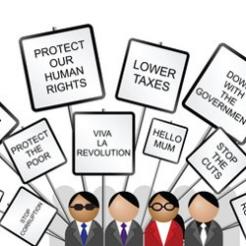Rosamund McCarthy says this election shows that charities must have more freedom to speak out on political issues.
A letter earlier this month to the Daily Telegraph from over 200 business chiefs hailing Conservative economic policies and warning of the danger of a Labour government was undoubtedly one of the more predictable events of the General Election campaign thus far.
But one interesting thing is the lack of a similar letter from 200 charity chief executives.
These corporate chief executives were writing in a personal capacity but the Telegraph and the rest of the media made no secret that they represented companies employing more than half a million people. It’s questionable how relevant that is. Being an employee, customer, or supplier of one of these companies doesn’t remotely signify you endorse the political stance of its chief executive.
On the other hand, where is the sector’s view on the election? Yes, individual charities and campaigning groups have their own policies, release manifestos, and even, on occasion, hold hustings. But a collective view is conspicuous by its absence.
This is despite the fact that civil society is measurably more accountable and democratic than either the major political parties or the business sector. The National Trust and RSPB alone have 4.7 million members. That is vastly more than the Conservatives (134,000), Labour (190,000), the Lib Dems (44,000), the Greens (59,000) or UKIP (39,000), put together. Aside from members, charities have stakeholders and boast millions of donors, volunteer fundraisers and web forum participants.
The fundamental restriction is charity law which allows charities to engage in political activities, but does not allow charities to have a political purpose or be party political. Then there is a tough attitude from the Charity Commission, and on top of that the Lobbying Act. All of this has combined to make it more difficult for charities to speak out.
The legal restriction preventing charities advancing a political purpose or pursuing party politics invariably rests on the fact that they receive tax reliefs. If charities are happy to take “the Crown’s shilling”, the argument runs, they must live by the rules and accept the resultant limitations. Yet tax reliefs are granted to a wide range of businesses and corporations, without the accompanying assumption that they should not interfere in party politics at election time.
Businesses can obtain all kinds of tax reliefs, such as the enterprise investment scheme, seed investment schemes or venture capital trust reliefs, without limiting their freedom of expression. Major multinationals use transfer pricing to reduce or avoid paying tax in the UK by locating in other countries. Yet only for charities is tax relief seen to entail some kind of gagging quid pro quo.
The voice of the voluntary sector has been distinctly muted in this election campaign. The parties get their message across, dutifully amplified by the media, while business figures are regularly asked for their opinions. But charities are largely silent and excluded, all the while patiently awaiting a poll result that will hugely affect their beneficiaries.
Austerity will continue to have a devastating effect on the most vulnerable in society. Disabled people are paying nine times more towards reducing the deficit than the average citizen. The potential repeal of the Human Rights Act by the Conservative Party will affect asylum seekers most of all. The promised £12bn cuts to the welfare budget will transform the lives of thousands of people whom charities exist to serve. For legions of their beneficiaries, nothing is more important than where these cuts will fall. At their heart, charities are about speaking for the powerless, disaffected and vulnerable yet during this election campaign their views are largely silent.
The presence of the voluntary sector was noticeably more apparent in the 2010 campaign. There were pledge campaigns, billboard posters, and websites listing the views of different candidates. Many organisations were not afraid, as one anonymous interviewee remarked in an analysis of the role of the sector, to “talk about issues around power and inequality”. The climate is very different this time around. The Charity Commission’s current stance on campaigning and the Lobbying Act has unquestionably had a chilling effect on the sector. As far as freedom of expression goes, there is a distinctly unlevel playing field between business and charity.
It’s highly unlikely that 100 charity chief executives, even in a personal capacity, would contemplate anything resembling the Telegraph’s business chiefs’ letter. And yet charities are immeasurably more representative of British society. We suffer from a democratic deficit, where people are not engaging with politics, but the one sector which can be said to truly remain in touch with society is effectively prevented from making an effective contribution to the election campaign. We can’t permit this to continue and must allow charities to have real freedom of expression.
The short-term aim of repealing the Lobbying Act is not enough. The status quo ante is not adequate. Yes, the Lobbying Act needs to be banished to the history books, but the underlying legislation which it amended, the Political Parties, Elections and Referendum Act 2000, is still too restrictive.
Even more fundamentally, in line with developments in charity law in Australia and New Zealand, charities should be able to have a political purpose and if necessary to be party political. Charities must have the same constitutional freedom of expression as corporates to speak out - particularly at election time. We need fundamental reform. Until that happens, talk of a level playing field with other sectors of society is just hollow rhetoric.









